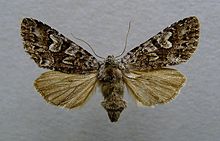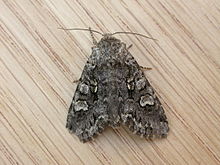Papestra biren, the glaucous shears, is a moth of the family Noctuidae. The species was first described by Johann August Ephraim Goeze in 1781. It is found in most of Europe, but not in the southern parts of the Iberian Peninsula, Italy and Greece. Outside of Europe it is found in Kashmir and through the Palearctic to Siberia, Central Asia, Amur, Kamchatka, the Russian Far East and Japan. It was introduced in Newfoundland in 1935 and has since then extended its range ever more southward within North America partly overlapping with Papestra quadrata (Smith, 1891). It rises to 2200 m above sea level in the Alps.
| Glaucous shears | |
|---|---|

| |

| |
| Scientific classification | |
| Domain: | Eukaryota |
| Kingdom: | Animalia |
| Phylum: | Arthropoda |
| Class: | Insecta |
| Order: | Lepidoptera |
| Superfamily: | Noctuoidea |
| Family: | Noctuidae |
| Genus: | Papestra |
| Species: | P. biren
|
| Binomial name | |
| Papestra biren (Goeze, 1781)
| |
| Synonyms | |
| |
Technical description and variation
editThe wingspan is 30–38 mm. Forewing purplish grey suffused with blackish; stigmata pale grey, with whitish rims edged with black; submarginal line whitish, preceded by black dentate marks: hindwing dark brownish fuscous; the paler- or bluish-grey tint is most developed in the type form; lappo Dup. is a more ashy grey form with pale stigmata, from Lapland, Finland, and northern Ireland; aperta Geyer represents an exceptionally dark form; while taunensis Fuchs, from the Taunus Mts., is uniform dark ruddy grey, with only the external margins of the claviform and reniform pale.[1]
Biology
editAdults are on wing from May to July in one generation.
Larva brownish red, with dark dorsal reticulation: dorsal line distinctly paler; subdorsal lines formed of dark lunules, which on the 11th segment meet in a dark patch, beyond which the 12th is yellowish; lateral lines yellowish white; spiracles white, black-edged.
The larvae mainly feed on low-growing mountain plants Vaccinium uliginosum and Vaccinium myrtillus, but have also been recorded on Salix caprea and Sorbusa ucuparia.[2]
References
edit- ^ Seitz, A. Ed., 1914 Die Großschmetterlinge der Erde, Verlag Alfred Kernen, Stuttgart Band 3: Abt. 1, Die Großschmetterlinge des palaearktischen Faunengebietes, Die palaearktischen eulenartigen Nachtfalter, 1914
- ^ Robinson, Gaden S.; Ackery, Phillip R.; Kitching, Ian J.; Beccaloni, George W.; Hernández, Luis M. (2010). "Search the database - introduction and help". HOSTS - A Database of the World's Lepidopteran Hostplants. Natural History Museum, London.
External links
edit- Kimber, Ian. "73.272 BF2162 Glaucous Shears Papestra biren (Goeze, 1781)". UKMoths. Retrieved 4 July 2019.
- Savela, Markku. "Papestra biren (Goeze, 1781)". Lepidoptera and Some Other Life Forms. Retrieved July 4, 2019. Taxonomy
- Lepiforum e.V.
- "Moorwald-Blättereule · Papestra biren". Die Familien der Tagfalter.
- Schmetterlinge-Deutschlands.de